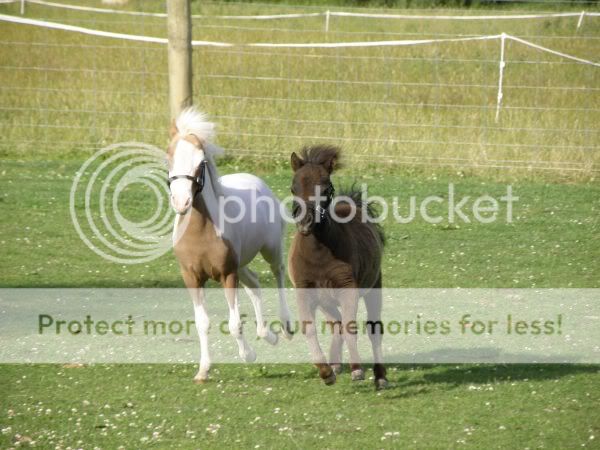Didn't severe inbreeding many years ago by old time breeders give us our dwarfism problems in the breed?
In a word, NO. Inbreeding, linebreeding or any other kind of breeding
did not cause the mutations that we call dwarfism, HYPP and HERDA. Mutations happen, and they are random; they don't care who the animal's parents were. Some mutations occur in places where there aren't any important genes in the first place, and produce no discernible change. Some mutations are so "wrong" that the animal dies, and that's the end of that. Some mutations may make an animal just a little bit better at whatever its kind do; that animal will be more successful, and the mutation gets passed on. That's natural selection. Where people make the selections, "different" may be enough to cause someone to select an animal as a breeder, and thus we have the wide range of dog breeds, many of which are totally incompetent as predators (which is a dog's natural role.)
Some of the horses in the early mini breeding programs were certainly dwarfs. Some people today are still breeding dwarfs. It doesn't matter whether the animals are related or not, if they carry the dwarf genes, they can pass them on. The problem is that some people don't know a dwarf when they see one, or don't recognise dwarfism as a problem. They see a small equine, and don't know or care enough to see the conformation flaws that signal a problem. If your breeding stock is free from the dwarf genes, it won't matter how close you breed, you won't get dwarf babies. OK, it is
possible that the mutation could occur again, but it could do that, even if your animals were completely unrelated, too.
The reason that HYPP and HERDA have become such problems, is that the mutation appeared in an animal that became very popular, and got to "spread his influence" around a lot before the problem was recognised. In the case of HYPP, the thought now is that the condition itself gave the Impressives their muscle-bound look, so people were actually selecting for it. I'm sure that the QH registry was hoping that the test that they have mandated would help to weed out the HYPP carriers, but that is unfortunately not the case. I know people that feel it is perfectly OK to breed HYPP carriers, just as long as you don't breed them to each other. Because of logic like that, I hear that HYPP is actually more common in QH's now than it was when the test first became available!
A breeding program is only as good as the selection process that goes into it. While an exceptional animal might just happen through sheer luck, it is more often the result of careful assessment of the breeding stock, and ruthless culling of animals that don't measure up. The name on the pedigree shouldn't be confused with a manufacturer's label. An old ad campaign said that "the quality goes in
before the name goes on;" without the culling process, the name means nothing!














































